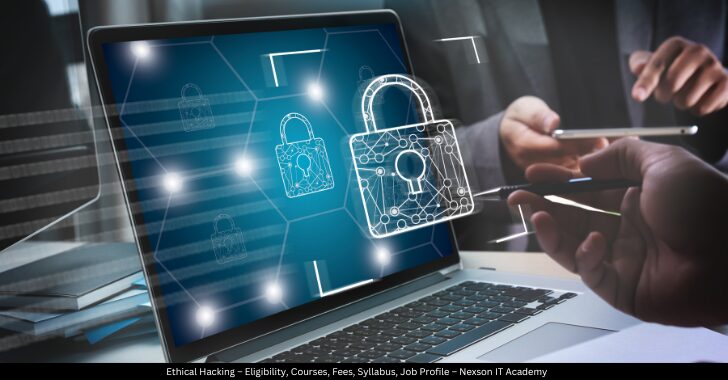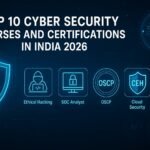Introduction
As digital transformations accelerate across industries, the need for cybersecurity grows significantly. Ethical Hacking has emerged as one of the most sought-after skills in the cybersecurity field, providing a proactive approach to defending against cyber threats. Nexson IT Academy offers comprehensive Ethical Hacking training programs designed to equip students and professionals with the necessary skills to thrive in this dynamic industry. This detailed guide covers everything you need to know about Ethical Hacking, from why it’s important in 2024 to how to begin your learning journey with top certifications, courses, tools, and trends.
Table of Contents
- Ethical Hacking Course Highlights
- Current Trends in Ethical Hacking
- Why Learn Ethical Hacking in 2024?
- How to Learn Ethical Hacking?
- Fundamental Concepts of Ethical Hacking
- Top Ethical Hacking Certifications and Programs
- 6.1 Ethical Hacking Diploma and Degree Programs
- 6.2 Minimum Eligibility for Enrolling in Online Ethical Hacking Courses
- 6.3 Who Should Go For Online Ethical Hacking Courses?
- 6.4 Top Online Ethical Hacking Courses
- Syllabus for Online Ethical Hacking Courses
- Tools To Look Out for in an Ethical Hacking Course
- 30 FAQs on Ethical Hacking
1. Ethical Hacking Course Highlights
Nexson IT Academy’s Ethical Hacking course has been meticulously crafted to meet the growing demand for cybersecurity professionals. Whether you’re a beginner or a seasoned IT professional looking to upskill, our program offers an ideal blend of theoretical knowledge and hands-on experience. Here’s what you can expect:
- Hands-On Practical Training: Real-world scenarios enable learners to apply theoretical concepts in a controlled environment, fostering deeper understanding.
- Experienced Instructors: Courses are delivered by cybersecurity experts with years of industry experience, ensuring quality education.
- Comprehensive Curriculum: The syllabus includes core topics like networking, penetration testing, VAPT (Vulnerability Assessment and Penetration Testing), and security management.
- Industry-Recognized Certifications: Certifications from Nexson IT Academy hold high value in the cybersecurity sector and can significantly boost employability.
- Flexible Learning Access: Lifetime access to a Learning Management System (LMS) with recorded sessions and resources allows you to learn at your own pace.
2. Current Trends in Ethical Hacking
With new technologies come new vulnerabilities, making it essential for Ethical Hackers to stay ahead of trends. Here are the top trends reshaping the Ethical Hacking landscape in 2024:
- AI-Powered Cybersecurity: Artificial Intelligence and Machine Learning are now essential in identifying and mitigating threats. Cyber attackers also leverage AI, pushing Ethical Hackers to innovate continuously.
- Cloud Security: The shift to cloud-based solutions requires securing cloud infrastructure and applications, making it an important focus area for Ethical Hackers.
- Mobile Security: The proliferation of mobile devices and applications has led to a surge in mobile security challenges, requiring specialized skills in mobile penetration testing.
- IoT Security: As IoT devices become more popular, securing them against attacks has become a significant concern for Ethical Hackers.
- Zero-Trust Security Models: The zero-trust approach to security is becoming more widely adopted, demanding Ethical Hackers with an understanding of how to assess and enforce these principles.
3. Why Learn Ethical Hacking in 2024?
The demand for Ethical Hacking is skyrocketing in 2024 due to increased cyber threats and data breaches across industries. Here are some compelling reasons to consider a career in Ethical Hacking:
- Growing Demand: There is a global shortage of cybersecurity professionals, leading to high demand for Ethical Hackers in every industry.
- High Earning Potential: Ethical Hackers often earn lucrative salaries, with roles like Certified Ethical Hacker (CEH), SOC Analyst, and Red Team Specialist paying well above the industry average.
- Career Versatility: Ethical Hacking skills are applicable across sectors, including finance, healthcare, government, and tech, offering versatile career options.
- Constant Learning and Development: Ethical Hacking is a dynamic field that evolves rapidly, providing endless opportunities for growth and skill development.
- Making a Difference: Ethical Hackers play a crucial role in defending organizations and individuals against cybercrime, contributing positively to society.
4. How to Learn Ethical Hacking?
Starting with the right approach is key to mastering Ethical Hacking. Here’s a roadmap to guide you:
- Enroll in a Reputable Course: Choose an institute with a solid reputation, experienced trainers, and a curriculum that covers all essential topics. Nexson IT Academy offers such comprehensive training.
- Obtain Relevant Certifications: Certification programs like CEH, CompTIA Security+, and CISSP provide a recognized credential that can enhance your employability.
- Engage in Practical Learning: Practice through labs, simulators, and case studies to gain hands-on experience.
- Stay Updated: Cybersecurity trends change rapidly; staying current with new vulnerabilities, tools, and technologies is crucial for success.
5. Fundamental Concepts of Ethical Hacking
Ethical Hacking involves a range of key concepts that serve as the foundation for identifying and mitigating security threats. Here are some of the core principles you’ll encounter in Nexson IT Academy’s Ethical Hacking course:
- Networking Basics: Understanding how networks operate, including protocols, IPs, and subnetting, is essential for Ethical Hackers.
- Security Fundamentals: Learning about risk analysis, threat modeling, and data protection mechanisms.
- Penetration Testing: The practice of simulating cyberattacks to evaluate the security of networks, systems, and applications.
- Cryptography: Encrypting data to prevent unauthorized access and ensure data integrity.
- System Hacking: Gaining knowledge about how attackers compromise systems allows Ethical Hackers to strengthen defenses.
6. Top Ethical Hacking Certifications and Programs
Ethical Hacking certifications can help establish credibility and open doors to high-paying jobs in the field. Here are some popular options:
6.1 Ethical Hacking Diploma and Degree Programs
In addition to certification courses, diplomas and degree programs in Cybersecurity or Information Technology with an Ethical Hacking focus are valuable for students looking to establish a long-term career in the field.
6.2 Minimum Eligibility for Enrolling in Online Ethical Hacking Courses
While there are no strict eligibility requirements, having a high school diploma or equivalent and a foundational understanding of IT and networking is helpful. Certain advanced certifications may require prior experience.
6.3 Who Should Go For Online Ethical Hacking Courses?
Online Ethical Hacking courses are ideal for:
- IT professionals aiming to specialize in cybersecurity.
- Students and graduates aspiring to enter the cybersecurity field.
- Professionals looking to upskill in areas like penetration testing, threat analysis, and vulnerability assessment.
6.4 Top Online Ethical Hacking Courses
Nexson IT Academy offers one of the top Ethical Hacking courses online, covering key topics and hands-on training with certification. Other popular certifications include:
- Certified Ethical Hacker (CEH)
- CompTIA Security+
- Certified Information Systems Security Professional (CISSP)
7. Syllabus for Online Ethical Hacking Courses
The Ethical Hacking syllabus at Nexson IT Academy includes:
- Networking and Security Fundamentals: Understanding the basics of networking, protocols, and security measures.
- System Vulnerabilities and Threats: Identifying and assessing security flaws in systems.
- Malware and Attack Vectors: Analyzing malware types, including viruses, worms, and trojans.
- Web Application Security: Addressing common vulnerabilities in web applications using tools like Burp Suite.
- Social Engineering and Phishing Attacks: Learning about psychological manipulation techniques.
- Wireless Security: Examining vulnerabilities in wireless networks.
- Cryptography and Encryption: Securing data with encryption methods.
- Incident Response and Management: Preparing and managing response plans for security incidents.
8. Tools To Look Out for in an Ethical Hacking Course
Ethical Hacking requires proficiency in various tools, which help professionals identify and exploit security vulnerabilities. Here are some commonly used tools:
- Metasploit: A powerful framework for penetration testing and exploitation.
- Wireshark: A packet analyzer for network troubleshooting and analysis.
- Nmap: A tool used to discover hosts and services on a network.
- Burp Suite: An integrated platform for web application security testing.
- Kali Linux: A specialized OS containing hundreds of pre-installed cybersecurity tools.
9. Tools To Look Out for in an Ethical Hacking Course
-
What is Ethical Hacking?
- Ethical Hacking is the authorized practice of identifying security vulnerabilities in systems and networks to protect against cyber threats.
-
What is the difference between Black Hat and White Hat hacking?
- Black Hat hacking involves illegal hacking for malicious purposes, while White Hat hacking, or Ethical Hacking, is performed legally to protect against threats.
-
How long does it take to learn Ethical Hacking?
- It varies, but most people can become proficient with 6-12 months of dedicated study and practice.
-
Is coding necessary for Ethical Hacking?
- Coding skills are helpful but not mandatory for beginners. Advanced roles may require knowledge of languages like Python, C++, and JavaScript.
-
What qualifications do I need to become an Ethical Hacker?
- A background in IT, computer science, or networking is beneficial, though entry-level certifications like CEH can help beginners start.
-
How much do Ethical Hackers earn?
- Salaries vary by location, experience, and certifications, with entry-level positions averaging $70,000 annually in the U.S.
-
What is the CEH certification?
- CEH (Certified Ethical Hacker) is a globally recognized certification that validates an individual’s skills in identifying, assessing, and mitigating security risks and vulnerabilities.
-
What are the different types of hackers?
- Hackers are typically classified as White Hat (Ethical Hackers), Black Hat (Malicious Hackers), and Grey Hat (Hackers who may break rules but without malicious intent).
-
Can I learn Ethical Hacking online?
- Yes, online courses, such as those offered by Nexson IT Academy, provide flexible learning options with access to resources, virtual labs, and certifications.
-
What tools are used in Ethical Hacking?
- Popular tools include Metasploit, Nmap, Wireshark, Burp Suite, and Kali Linux, all commonly used for various hacking techniques and testing.
-
What is penetration testing?
- Penetration testing involves simulating attacks on a system to identify vulnerabilities, which can then be mitigated to strengthen security.
-
What is VAPT?
- VAPT (Vulnerability Assessment and Penetration Testing) is a process of identifying vulnerabilities in systems and networks through systematic testing.
-
Is Ethical Hacking legal?
- Yes, Ethical Hacking is legal as long as it’s performed with permission and follows the laws and guidelines for protecting systems and data.
-
Do I need a degree to become an Ethical Hacker?
- A degree in IT or computer science is helpful, but not mandatory. Many professionals enter the field with certifications and practical experience.
-
What industries require Ethical Hackers?
- Ethical Hackers are needed across industries such as finance, healthcare, government, technology, and retail due to the growing threat of cyber attacks.
-
What are the basic skills required for Ethical Hacking?
- Essential skills include understanding networking, operating systems, scripting, web application security, and vulnerability assessment.
-
How much does an Ethical Hacking course cost?
- Costs vary widely depending on the program, but Nexson IT Academy offers affordable and flexible payment options for students.
-
What is a Red Team in cybersecurity?
- A Red Team consists of Ethical Hackers who simulate real-world attacks to test an organization’s defenses and improve incident response.
-
What are the steps in Ethical Hacking?
- The primary steps include Reconnaissance, Scanning, Gaining Access, Maintaining Access, and Covering Tracks.
-
What is Social Engineering?
- Social Engineering is a manipulation technique used to trick individuals into divulging confidential information, such as passwords or account details.
-
What is a Cybersecurity Framework?
- A framework like NIST or ISO provides a structured approach for organizations to implement cybersecurity policies and practices.
-
Is Ethical Hacking difficult to learn?
- It can be challenging, especially at advanced levels, but with dedication, practice, and the right resources, anyone can learn Ethical Hacking.
-
How can Ethical Hackers protect IoT devices?
- Ethical Hackers identify vulnerabilities in IoT networks and recommend security configurations to protect against unauthorized access.
-
What is Bug Bounty?
- Bug Bounty is a program where organizations reward individuals who find and report security vulnerabilities in their systems.
-
Can I learn Ethical Hacking on my own?
- Self-study is possible, but structured training from institutes like Nexson IT Academy offers guidance, access to labs, and certifications for career advancement.
-
What’s the future of Ethical Hacking?
- With cyber threats evolving, Ethical Hacking will continue to be in high demand, especially as technologies like AI and IoT advance.
-
What are some ethical considerations in hacking?
- Ethical Hackers must respect privacy, adhere to legal boundaries, and always work with permission to avoid compromising ethical standards.
-
What are Blue Team roles in cybersecurity?
- Blue Teams focus on defensive security, monitoring systems, and protecting against attacks, often collaborating with Red Teams to strengthen security.
-
What certifications do Ethical Hackers need?
- Essential certifications include CEH, CompTIA Security+, CISSP, and OSCP, which validate skills in various aspects of cybersecurity.
-
How can Nexson IT Academy help me become an Ethical Hacker?
- Nexson IT Academy offers expert-led training, hands-on labs, certifications, and career support to help students and professionals build successful careers in Ethical Hacking.
Conclusion
Ethical Hacking is not just a career but a commitment to safeguarding the digital world. As cyber threats grow increasingly complex, the need for skilled Ethical Hackers continues to rise. Nexson IT Academy’s Ethical Hacking program provides an all-inclusive learning experience with practical training, industry-recognized certifications, and access to real-world projects that can help you excel in the cybersecurity field.
Whether you’re starting from scratch or enhancing existing skills, our program is tailored to equip you with the knowledge, tools, and confidence needed to secure valuable assets in the digital realm. Join Nexson IT Academy today and take the first step towards becoming a certified Ethical Hacker.
Related Keywords Summary
- Ethical Hacking Course
- Ethical Hacking Certification
- Ethical Hacking Training Online
- Ethical Hacking Institute
- Cybersecurity Training Program
- Best Ethical Hacking Course
- Ethical Hacking Certification Course in Hyderabad
- Ethical Hacking Salary
- Learn Ethical Hacking
- Ethical Hacking Tools
- Red Team and Blue Team in Cybersecurity
- Nexson IT Academy Ethical Hacking
- Online Cybersecurity Training







Recent Comments